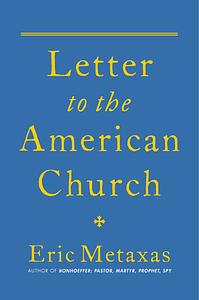Take a photo of a barcode or cover
[a:Eric Metaxas|32105|Eric Metaxas|https://images.gr-assets.com/authors/1291549438p2/32105.jpg]' [b:Letter to the American Church|61034085|Letter to the American Church|Eric Metaxas|https://i.gr-assets.com/images/S/compressed.photo.goodreads.com/books/1661086397l/61034085._SY75_.jpg|96180575] sets out to issue a clarion call to American Christians, drawing stark parallels between the current state of the American church and the German church during the rise of the Nazi Regime. Framed as an urgent warning, the book apparently seeks to shake the church out of complacency and inspire it to take a stand against the cultural and moral decline of contemporary society as Metaxas' sees it. While the book does address these critical issues, its execution is less than perfect.
When picking up this book, one might expect a creative approach akin to an epistolary format, drawing from the rich tradition of letters in Scripture, such as those by the Apostle Paul. Unfortunately, despite its naming, Metaxas adopts a more conventional Christian non-fiction approach. While this format does allow for clarity and accessibility, it feels somewhat underwhelming given the weight of the subject matter. A more dynamic and unique structure could have helped underscore the urgency and intimacy of Metaxas' message.
Metaxas draws heavily on the life and work of [a:Dietrich Bonhoeffer|29333|Dietrich Bonhoeffer|https://images.gr-assets.com/authors/1225837391p2/29333.jpg], a German Lutheran pastor who resisted Hitler's regime and became a central figure in the Confessing Church. Metaxas uses Bonhoeffer's warning's to the German church as a cautionary tale for American Christians. The parallels between a silent German church in the face of rising evil and an American church heading in the same direction, often with the lukewarm faith described in Revelation 3:14-22, are compelling. However, Metaxas' over-reliance on Bonhoeffer to build his argument ultimately weakens the book. While Bonhoeffer's story is indeed instructive, it cannot and should not bear the full weight of Metaxas' thesis. Given his prior work, [b:Bonhoeffer: Pastor, Martyr, Prophet, Spy|7501962|Bonhoeffer Pastor, Martyr, Prophet, Spy|Eric Metaxas|https://i.gr-assets.com/images/S/compressed.photo.goodreads.com/books/1298218180l/7501962._SX50_.jpg|6801520], Metaxas is undoubtedly well-versed in this area, but the narrative would be enriched by drawing from additional historical or contemporary examples. A broader evidentiary base would have given the argument much needed depth, that sadly was lacking.
One of the book's significant shortcomings is its lack of actionable guidance for readers. Metaxas convincingly asserts that the American church must act to avoid the pitfalls of complacency, yet he fails to articulate the concrete steps for achieving this. Beyond the call to "speak out," the book provides little by way of practical advice for individuals or congregations. Given the urgent tone and the parallels to Bonhoeffer's context, readers may very well find themselves inspired yet unsure of how to act upon that inspiration.
Despite its flaws, [b:Letter to the American Church|61034085|Letter to the American Church|Eric Metaxas|https://i.gr-assets.com/images/S/compressed.photo.goodreads.com/books/1661086397l/61034085._SY75_.jpg|96180575] does have its strengths. The historical analysis of the German church during Hitler's rise is insightful and educational. It underscores the dangers of silence and the moral imperative of speaking against injustice and for God's will, a lesson that remains as relevant as ever. The critique of the American church's lukewarm faith is sharp and necessary, even if the truth is uncomfortable to here. However, Metaxas misses the opportunity to provide a more comprehensive roadmap for revival and action within the American church. The result is a work that feels more like a call to alarm than a guide for change.
In the end, the book is a thought-provoking short book that is ultimately uneven. While it raises urgent and necessary questions about the state of faith and morality in America, it's reliance on essentially a single historical example and its lack of actionable guidance limits its impact. Readers who are interested in Bonhoeffer's legacy or the intersection of faith and societal responsibility will likely find value in the read, but for those looking for guidance may end up without the answers they hoped for. For its insights and intentions, along with a good display of historical information, I give the book 3 out of 5 stars.
When picking up this book, one might expect a creative approach akin to an epistolary format, drawing from the rich tradition of letters in Scripture, such as those by the Apostle Paul. Unfortunately, despite its naming, Metaxas adopts a more conventional Christian non-fiction approach. While this format does allow for clarity and accessibility, it feels somewhat underwhelming given the weight of the subject matter. A more dynamic and unique structure could have helped underscore the urgency and intimacy of Metaxas' message.
Metaxas draws heavily on the life and work of [a:Dietrich Bonhoeffer|29333|Dietrich Bonhoeffer|https://images.gr-assets.com/authors/1225837391p2/29333.jpg], a German Lutheran pastor who resisted Hitler's regime and became a central figure in the Confessing Church. Metaxas uses Bonhoeffer's warning's to the German church as a cautionary tale for American Christians. The parallels between a silent German church in the face of rising evil and an American church heading in the same direction, often with the lukewarm faith described in Revelation 3:14-22, are compelling. However, Metaxas' over-reliance on Bonhoeffer to build his argument ultimately weakens the book. While Bonhoeffer's story is indeed instructive, it cannot and should not bear the full weight of Metaxas' thesis. Given his prior work, [b:Bonhoeffer: Pastor, Martyr, Prophet, Spy|7501962|Bonhoeffer Pastor, Martyr, Prophet, Spy|Eric Metaxas|https://i.gr-assets.com/images/S/compressed.photo.goodreads.com/books/1298218180l/7501962._SX50_.jpg|6801520], Metaxas is undoubtedly well-versed in this area, but the narrative would be enriched by drawing from additional historical or contemporary examples. A broader evidentiary base would have given the argument much needed depth, that sadly was lacking.
One of the book's significant shortcomings is its lack of actionable guidance for readers. Metaxas convincingly asserts that the American church must act to avoid the pitfalls of complacency, yet he fails to articulate the concrete steps for achieving this. Beyond the call to "speak out," the book provides little by way of practical advice for individuals or congregations. Given the urgent tone and the parallels to Bonhoeffer's context, readers may very well find themselves inspired yet unsure of how to act upon that inspiration.
Despite its flaws, [b:Letter to the American Church|61034085|Letter to the American Church|Eric Metaxas|https://i.gr-assets.com/images/S/compressed.photo.goodreads.com/books/1661086397l/61034085._SY75_.jpg|96180575] does have its strengths. The historical analysis of the German church during Hitler's rise is insightful and educational. It underscores the dangers of silence and the moral imperative of speaking against injustice and for God's will, a lesson that remains as relevant as ever. The critique of the American church's lukewarm faith is sharp and necessary, even if the truth is uncomfortable to here. However, Metaxas misses the opportunity to provide a more comprehensive roadmap for revival and action within the American church. The result is a work that feels more like a call to alarm than a guide for change.
In the end, the book is a thought-provoking short book that is ultimately uneven. While it raises urgent and necessary questions about the state of faith and morality in America, it's reliance on essentially a single historical example and its lack of actionable guidance limits its impact. Readers who are interested in Bonhoeffer's legacy or the intersection of faith and societal responsibility will likely find value in the read, but for those looking for guidance may end up without the answers they hoped for. For its insights and intentions, along with a good display of historical information, I give the book 3 out of 5 stars.
challenging
dark
hopeful
informative
inspiring
reflective
medium-paced
challenging
informative
inspiring
reflective
Eric Metaxas’ Letter to the American Church urges Christians to confront cultural and political issues, drawing parallels to the German church’s inaction during Nazism. Its passionate tone and historical analogies are compelling but often oversimplify complex issues. The book lacks nuance and can feel polarizing. Worth reading for its provocative ideas, but it falls short of a balanced approach. Three stars.
inspiring
fast-paced
challenging
fast-paced
A stern warning to the church in America about what can, or rather, *will* happen, if Christians remain silent in the face of evil. The author encourages Christians that it is always the right time to do the right thing. He warns church leaders that they have a responsibility to speak about these things from the pulpit, using Bonhoeffer as a prime example. I thoroughly enjoyed this short book and feel it is a very timely message for American Christians.
challenging
informative
inspiring
reflective
fast-paced
My first Eric Metaxes book. Thought it was a good place to start given Bonhoeffer is a huge book! This book was good, although going into it blindly, I was not expecting the comparisons to the German church in Nazi Germany. Very convicting, though I felt the call to action was kind of vague. "Speak out against injustice," of course, but what is the best way to do that? Perhaps these are the good types of questions that the reader should be left with to ponder over. The book makes you think about your place in the Church of the United States and what it means to be the Church. Even though this is a short book, I think it could've been shorter as some of it felt redundant and repetitive.
Overall, this book was a solid reminder of the modern-day church’s lack of courage and commitment to the Faith God has called us to live up to.
This book explores the connections between the rise of Nazi Germany’s take over by separating church and state and the cowardice of the German church of that time.
I do wish the author went more in depth in the small daily actions of Christian living than simply the Big 2 (sexuality and abortion), because the problems start with the inconsistencies of the small actions.
I would love to hear a charge about the daily examination of the Christian life, the daily carrying of your cross, the meditation of Bible reading, the boldness of witnessing, etc.
Still, this book drew a great connection between the history of cowardly “Christians” and how it’s not so much different today.
He ends with a call of courage and faith to not shy away from speaking with authority and power in the face of today’s evils.
This book explores the connections between the rise of Nazi Germany’s take over by separating church and state and the cowardice of the German church of that time.
I do wish the author went more in depth in the small daily actions of Christian living than simply the Big 2 (sexuality and abortion), because the problems start with the inconsistencies of the small actions.
I would love to hear a charge about the daily examination of the Christian life, the daily carrying of your cross, the meditation of Bible reading, the boldness of witnessing, etc.
Still, this book drew a great connection between the history of cowardly “Christians” and how it’s not so much different today.
He ends with a call of courage and faith to not shy away from speaking with authority and power in the face of today’s evils.
challenging
informative
inspiring
reflective
“Silence in the face of evil is itself evil.
Not to speak is to speak.
Not to act is to act.
God will not hold us guiltless.”
Eric Metaxas calls the church to not create a “spiral of silence”, but to take an active role in fighting darkness in our culture and protecting the weak and vulnerable. He uses scripture and examples from the lives of Martin Luther and Dietrich Bonhoeffer.
Not to speak is to speak.
Not to act is to act.
God will not hold us guiltless.”
Eric Metaxas calls the church to not create a “spiral of silence”, but to take an active role in fighting darkness in our culture and protecting the weak and vulnerable. He uses scripture and examples from the lives of Martin Luther and Dietrich Bonhoeffer.





